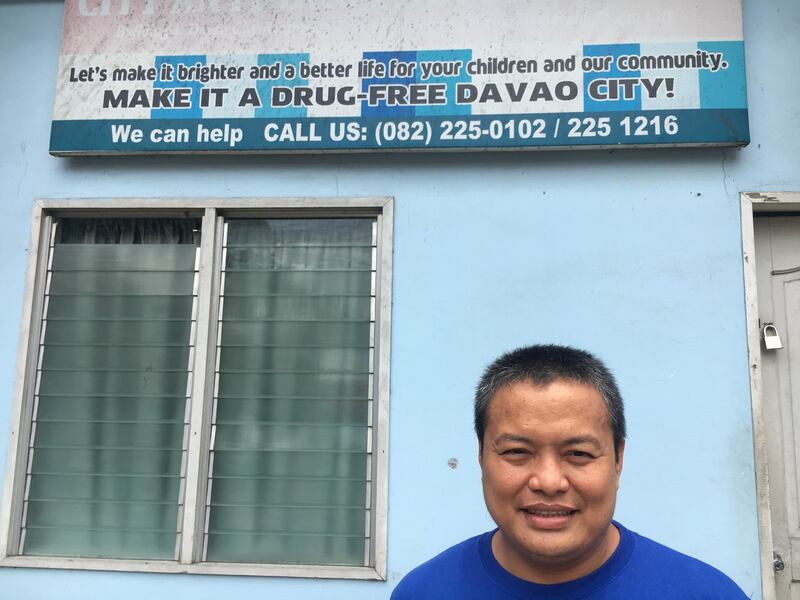Colin Freeman
Foreign Correspondent
DAVAO, PHILIPPINES // In the controversial war on drugs waged by President Rodrigo Duterte, Ronaldo Rivera is an unlikely ally.
Now 50, he says he smoked his first joint when he was just 12, before moving onto shabu, a cheap form of crystal meth. He got even more addicted during his 20s and 30s, until one day, he was finally caught smoking it in the street.
“I was completely hooked by then,” he remembers. “I even asked the arresting officer if I could just finish my stash before going to the police cells.”
That wasn’t allowed. But otherwise, Mr Rivera got good treatment. After nine days behind bars, he was packed off to the city council’s drug rehab programme, which he credits with keeping him clean for the last 14 years.
Other drug users in his home city of Davao in the Southern Philippines were not so lucky.
The mayor of Davao at that time was none other than Mr Duterte, who used his role to pioneer the hardline anti-drugs strategy that helped win him the presidency last year.
It was here that reports first emerged of Duterte-backed police “death squads”, tasked with ridding Davao of suspected drug users, dealers and other criminals. Between 1998 and 2015, they cleaned up what was then a notoriously crime-plagued city, but in the process, anything up to 1,000 extra-judicial killings (EJK) took place.
Since Mr Duterte began rolling out his anti-drugs strategy nationwide last July, the number of EJKs has rocketed to 7,000 or more, according to human rights groups, who want him investigated by the International Criminal Court.
But while the president’s critics include many drug charities, Mr Rivera, who now works for Davao city council’s rehab programme, is not among them.
Much as he dislikes the killings, which he describes as “collateral damage”, he defends the president’s strategy, believing it will tackle a problem previous governments just ignored.
“If it scares people enough to seek treatment, then it must be good,” he says bluntly.
That it certainly has done. Since Mr Duterte took power, more than 700,000 drug users have formally “surrendered” to the authorities, a process under which they register with local neighbourhood chiefs who then refer them to government-run rehab centres for treatment.
Critics point out that there are not enough rehab centres in the country, much less enough that can provide high standard care.
Mr Rivera says that if other mayors had followed Mr Duterte’s example in Davao, this would not be such a problem in the Philippines. As part of his anti-drug strategy for the city, he also financed what was then one of the Philippines’ only proper rehab programmes.
“It has everything you need - education, assistance, and help after treatment,” Mr Rivera said. “Plus he was doing this kind of thing back when nobody else was bothering at all.”
Many of the addicts now queuing up for treatment are doing so as much out of fear as a desire to kick their drug habits.
But according to Mr Rivera’s colleague Bryan Bajado, a co-ordinator at the city council rehab programme, what might seem unfashionably authoritarian in the West is not necessarily seen as such in the Philippines.
“Does the Philippines need this tough guy strategy? Perhaps so, yes,” he said. “Duterte is like a strict father, he’s tough when people go wrong, and helpful when they make amends. Also, he wouldn’t put ex-drug users like us to head a programme if he didn’t trust us.”
Such arguments are somewhat at odds with the views of the global drug policy establishment, which increasingly leans towards much more liberal approaches, including decriminalising drugs altogether.
Last month, visiting UN Special Rapporteur on extra-judicial executions, Agnes Callamard, pointedly declared during a drug conference in Manila that “war on drugs” strategies did not work.
In comments that infuriated the government, the Frenchwoman said such approaches nearly always failed, and “risked invigorating the rule of violence rather than the rule of law”.
Mr Duterte replied by suggesting that she should “go on honeymoon” with Carl Hart, an American professor whose studies query evidence that shabu causes brain damage or violent behaviour.
“When I became mayor of Davao City there was always a lot of violence and killing because of shabu,” the president said.
It was a typical blast of rhetoric from Mr Duterte, who has long used his “voice of the common man” approachto speak unpalatable truths to elites.
It accounts for much of his 75 per cent approval ratings - and possibly also his recent invitation to the White House from Donald Trump, who is understood to approve of his drug policies.
With or without friends in high places, though, Mr Duterte may also find comfort from the fact that some of those who now back his drug war are themselves former addicts.
For as easy as it is for him to quarrel with visiting drug experts himself, it may be more effective in the long run to have ex-users doing his arguing for him.
“Other people are entitled to their opinion,” added Mr Bajado. “But the majority of our people are in agreement with this strategy, and we think it’s working.”
foreign.desk@thenational.ae





